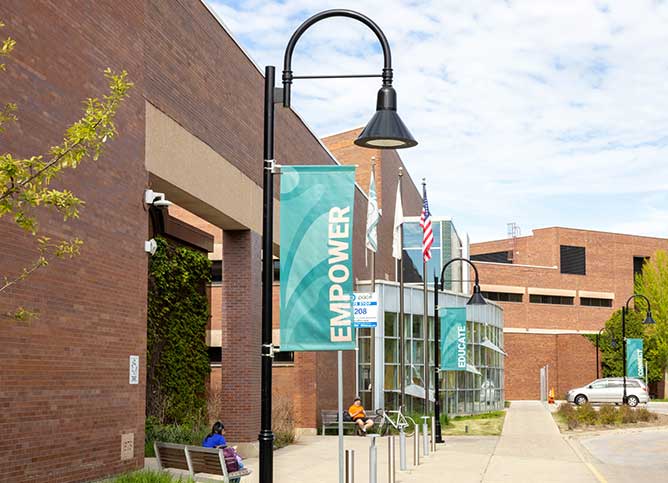The goal of the Medical Laboratory Technology curriculum is to provide a broad science background and courses in both theoretical and practical aspects of clinical laboratory science. Medical laboratory technicians work to determine the presence, extent or absence of disease and provide data needed to evaluate the effectiveness of treatment in hospitals, clinics, physicians’ offices and commercial laboratories.
Learn More About Medical Laboratory Technology Associate in Applied Science (A.A.S.)
The goal of the Phlebotomy Certificate program is to train individuals to perform phlebotomy procedures, the collection of blood for diagnostic testing. The curriculum at Oakton is in compliance with standardized educational curricula and accepted routes for national certification, in preparation for qualification by national and state agencies. This certificate is of value to health care professionals, including nurses.
The Pharmacy Technician program is designed to teach fundamentals of being a pharmacy technician for those interested in becoming pharmacy technicians, pre-pharmacy students, or those interested in completing the Pharmacy Technician Certification Board Examination. Classes are taught by a Registered Pharmacist or Doctor of Pharmacy. The course covers various pharmacy practice settings, drug classes, basic physiology, drug interactions, pharmacy calculations, and daily pharmacy operations.
Enrolling at Oakton College can save you thousands of dollars and help you earn more over the course of your career. Our tuition is among the lowest in the region, and we offer many ways to bring your costs down even more.
99 percent of Oakton students graduate without debt.
To help you get there, you can apply for a scholarship, which you don’t have to pay back. We award $12 million in scholarships annually. Financial Aid includes grants, loans, and other forms of financial assistance that can reduce your costs of attending college.
We offer payment options that give you control over how you pay. Pay all at once or spread your payments over the course of the semester.
Learn more about your options for paying for your education

Oakton's Academic Catalog is your guide to programs, course descriptions and policies. You will find an overview of what classes are required for your certificate/degree, your pathway (or suggested sequence of classwork), along with learning outcomes.
Connecting with an advisor before you start the enrollment process can help you on your best path forward.

The minimum qualifications are:
High school graduation or High School Equivalency certificate
High School grade point average of 2.0 or higher
One year of high school or one semester of college:
Foreign high school graduates or students with foreign college credits need to send English translated copies of their transcripts to Educational Perspectives, www.edperspective.org/oakton. Students with foreign college credits should request a catalog match.
Limited Enrollment Health Career Accuplacer reading placement test, taken at Oakton’s Testing Center.
Required minimum score of 250. Results expire after three years.
Prove placement into Oakton English (EGL) 101 through Oakton accepted placement measures, or prove Oakton EGL 101 equivalent taken in college by sending an official transcript for evaluation.
ACT score of 21 or higher, or SAT score of 1060 or higher, or minimum of 12 credit hours from the following courses with a grade of C or better: Biology 231, 232, and Chemistry 121, 122
Cumulative college GPA of 2.0 or better
Additionally, each medical laboratory technology student must be able to perform each of the following Essential Skills. Those admitted will be required to submit a current and complete physical examination record, clear criminal background check and drug screen. Also, pass a color eye screening - color vision exam. (Applicants schedule a vision screening appointment with Oakton's Health Services Office before receiving an MLT interview invitation).
All applicants are encouraged to meet with a Health Career Specialist, healthcareeradvising@oakton.edu.
We also recommend that you view an Information Session video below prior to applying.
This is a limited enrollment program.
Application Process
All applicants are encouraged to meet with a health career specialist, healthcareeradvising@oakton.edu.
Clinical placements require a health assessment, certain immunizations, yearly flu vaccine, substance abuse testing, criminal background check, specific skill certification (i.e., CPR) and health insurance. These requirements represent an additional cost to the student.
All Oakton College Health Career students in nursing, physical therapist assistant, medical laboratory technology, pharmacy technician, phlebotomy, health information technology, cancer registry management, and medical assistant programs must have "clear" criminal background checks and drug screens in order to participate in any and all clinical components of any health career program courses. See the career programs pages for further details.
To comply with state statutes and clinical affiliation agreements, and to provide a safe environment for students, employees, and patients cared for by students, those accepted into Oakton's health career programs will be required to complete a criminal background check and drug screening through a company contracted by the College. Health Career students will be charged a fee for this service.
Timelines for completing criminal background checks and drug screens may vary among the various programs. Deadline dates for each program will be provided by the individual department chairs at the time of a student's acceptance into a health career program.
Students without a clear criminal background check and/or clear drug screen will not be allowed to enroll in clinical practicum courses or attend clinical programs. This would further necessitate that the student withdraw from the health career program at that time.
Students who refuse a criminal background check and/or drug screen will not be considered "clear" and will not be authorized to participate in the clinical component of the health career program, necessitating withdrawal from the program at that time.
Individual results of student background checks and drug screens are considered confidential.
Determination of whether or not a student can participate in the clinical component of a particular health career program will be communicated to the respective department chairs by the Background Check/Drug Screen vendor. Students may view their personal results on the vendor's website.
With the availability of the COVID-19 vaccine, our clinical site partners are updating their requirements for COVID-19 vaccination. Oakton must also follow the requirements of our clinical sites with regard to immunization requirements. It is the decision of the clinical sites, not Oakton, if immunizations are required for our students. Effective for the Spring 2022 semester, the clinical facility partners will not permit students to participate in clinical experiences at any of their facilities without the COVID-19 vaccination.
Students are not employees and have neither employee benefits nor access through employee health services at the facility, therefore, accommodations for declination of vaccination will not be honored. As guests of each facility, Oakton programs must abide by the rules of the facility.
Students must provide proof of vaccination. Failure to provide documentation will result in student dismissal from clinical courses.
Essential skills represent the non-academic ability of the applicant or the student to accomplish the essential requirements of the medical laboratory technology program. These standards are based on the essential skills of the medical laboratory technology student. They must be mastered in order to obtain credit for the educational program. Students are expected to perform satisfactorily in the following domains:
Physical
Cognitive
Emotional/Psychological
|
Year |
Graduation Rates |
ASCP (American Society of Clinical Pathology) Pass Rates |
Job Placement Rates |
|
2024 |
87% |
100% |
92.3% |
|
2023 |
100% |
100% |
100% |
|
2022 |
100% |
100% |
100% |
|
2021 |
100% |
89% |
100% |
The Oakton College Medical Laboratory Technician program is accredited by the National Accrediting Agency for Clinical Laboratory Services.
Email: naaclsinfo@naacls.org
Address: NAACLS, 5600 N. River Road, Suite 720, Rosemont, IL 60018
Phone: 773.714.8880
Fax: 773.714.8886
Meet our full-time faculty
Christine Hoang
Instructor of Medical Laboratory Technology, Chair,
Medical Laboratory Technology
B.A. Long Island University
M.S. Rush University
847.376.7063
204B Lee Ctr. Des Plaines
choang@oakton.edu
Joanna Soupos
Assistant Professor of Medical Laboratory Technology, Coordinator, Medical Laboratory Technology and Phlebotomy
B.S. University of Illinois at Chicago
847.376.7113
206 Lee Ctr. Des Plaines
jsoupos@oakton.edu
Meet our part-time faculty
Kyung Jung
Lecturer
847.635.1684
100 Lee Ctr. Des Plaines
kjung@oakton.edu
Panagiota Salgado
Program Director, Lecturer
Medical Laboratory Technology
A.S. Oakton Community College
B.S. Benedictine University
M.S. Benedictine University
847.635.1862
100 Lee Ctr. Des Plaines
psalgado@oakton.edu
Maha Shahin
Lecturer
847.635.1684
100 Lee Ctr. Des Plaines
mshahin@oakton.edu
Licensure Requirements: Each state and territory has different licensure and certification requirements. Oakton has researched and/or contacted state licensing authorities to confirm that the program meets the educational requirements leading to professional licensure. Other licensure requirements may include professional certification exams, background checks, years of work experience, fingerprinting, etc.
Licensure information is reviewed and updated on this site in June of each year. Licensure information is reviewed and updated on this site in June of each year. As of July 1, 2020, we have determined that individuals that successfully complete Medical Laboratory Technology AAS Degree Program curriculum:
Meets the education requirements leading to licensure/certification in these states and U.S. Territories: Illinois
Does NOT meet the education requirements For licensure/certification in these states and U.S. Territories:
We have not made a determination if the program curriculum meets the requirements for licensure/certification in these states and US Territories: Alabama, Alaska, American Samoa, Arizona, Arkansas, California, Colorado, Connecticut, Delaware, District of Columbia, Florida, Georgia, Guam, Hawaii, Idaho, Indiana, Iowa, Kansas, Kentucky, Louisiana, Maine, Maryland, Massachusetts, Michigan, Minnesota, Mississippi, Missouri, Montana, Nebraska, Nevada,New Hampshire, New Jersey,New Mexico, New York, North Carolina, North Dakota, Northern Mariana Islands, Ohio, Oklahoma, Oregon, Pennsylvania, Puerto Rico, Rhode Island, South Carolina, South Dakota, Tennessee, Texas, U.S. Virgin Islands, Utah, Vermont, Virginia, Washington, West Virginia, Wisconsin, Wyoming
If you intend to practice in any state other than Illinois, you should contact the appropriate licensing agency to independently verify whether Oakton’s program satisfies the educational requirements for licensure in a particular state before beginning Oakton’s program. Be aware that state licensure requirements may change from time-to-time and that states may have conditions for licensure in addition to educational requirements.
This information is provided to meet the Disclosure Requirements for Academic Programs Leading to Professional Licensure or Certification.
Licensure Requirements: Each state and territory has different licensure and certification requirements. Oakton has researched and/or contacted state licensing authorities to confirm that the program meets the educational requirements leading to professional licensure. Other licensure requirements may include professional certification exams, background checks, years of work experience, fingerprinting, etc.
Licensure information is reviewed and updated on this site in June of each year. Licensure information is reviewed and updated on this site in June of each year. As of July 1, 2020, we have determined that individuals that successfully complete Phlebotomy Certificate Program curriculum:
Meets the education requirements leading to licensure/certification in these states and U.S. Territories: Illinois
Does NOT meet the education requirements For licensure/certification in these states and U.S. Territories:
We have not made a determination if the program curriculum meets the requirements for licensure/certification in these states and US Territories: Alabama, Alaska, American Samoa, Arizona, Arkansas, California, Colorado, Connecticut, Delaware, District of Columbia, Florida, Georgia, Guam, Hawaii, Idaho, Indiana, Iowa, Kansas, Kentucky, Louisiana, Maine, Maryland, Massachusetts, Michigan, Minnesota, Mississippi, Missouri, Montana, Nebraska, Nevada,New Hampshire, New Jersey,New Mexico, New York, North Carolina, North Dakota, Northern Mariana Islands, Ohio, Oklahoma, Oregon, Pennsylvania, Puerto Rico, Rhode Island, South Carolina, South Dakota, Tennessee, Texas, U.S. Virgin Islands, Utah, Vermont, Virginia, Washington, West Virginia, Wisconsin, Wyoming
If you intend to practice in any state other than Illinois, you should contact the appropriate licensing agency to independently verify whether Oakton’s program satisfies the educational requirements for licensure in a particular state before beginning Oakton’s program. Be aware that state licensure requirements may change from time-to-time and that states may have conditions for licensure in addition to educational requirements.
This information is provided to meet the Disclosure Requirements for Academic Programs Leading to Professional Licensure or Certification.